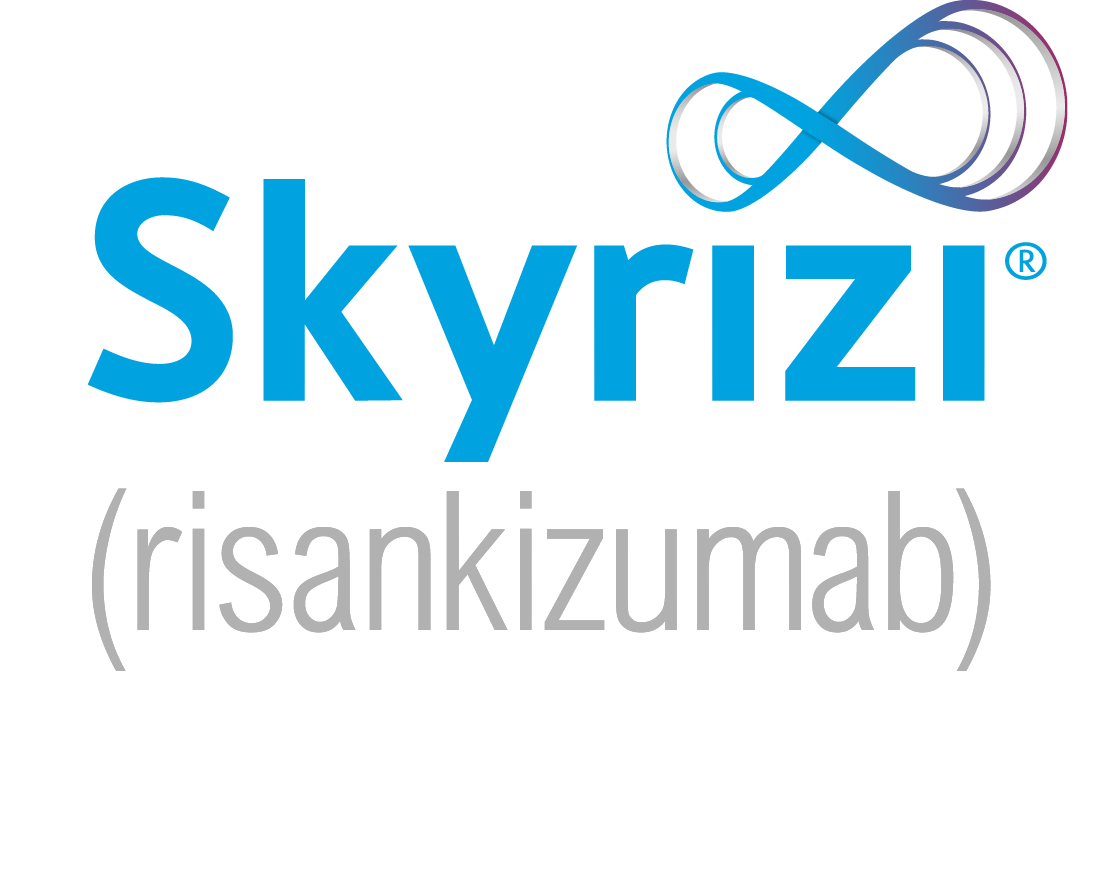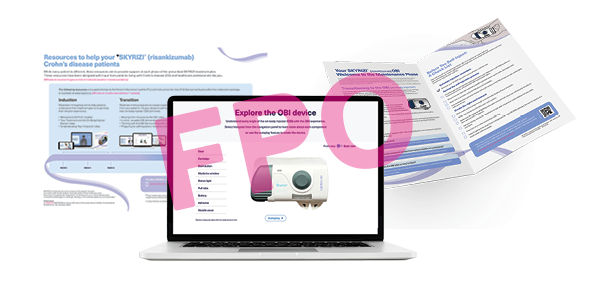INTRODUCING
ABBVIE CARE FOR ULCERATIVE COLITIS
How can AbbVie Care help set your patients up for success?
While every patient is different, AbbVie Care resources aim to support your ulcerative colitis (UC) patients at each phase of their prescribed SKYRIZI treatment plan. These resources have been designed with input from patients living with UC and healthcare professionals like you.
Resources for patients
Educational brochures, activity sheets, and a series of instructional videos aim to help patients correctly administer their medication and engage with their own care. Topics include:
- Understanding UC and how SKYRIZI can help
- Following along with the treatment plan
- Learning how to self-inject with the SKYRIZI On-Body Injector (OBI) device
The myAbbVieCare Patient Portal
A website designed for patients that enables them to:
- Browse educational articles, slideshows, and videos
- Follow along with their treatment plan
- Record their infusions and injections
- Manage their healthcare appointments
- Download a PDF report to share with you and your team
Resources for healthcare professionals
Reference sheets, an interactive 360° experience of the OBI, and training videos aim to help you and your team support your patients by:
- Using the in-clinic demonstration SKYRIZI OBI device to teach the self-injection process
- Building your patients’ confidence in self-injecting with the OBI
Note to Affiliate: Align to the most up-to-date AbbVie Care layout. Please update and edit in light of local AbbVie Care content.
Contact AbbVie Care to learn more and access these resources
<Affiliate to add link>
Indication1
SKYRIZI is indicated for the treatment of adult patients with moderately to severely active ulcerative colitis who have had an inadequate response to, lost response to, or were intolerant to conventional therapy or a biologic therapy.
Important Safety Information1
Affiliate to insert local ISI.
Risankizumab is contraindicated in patients hypersensitive to the active substance or to any of the excipients, and in patients with clinically important active infections (e.g. active tuberculosis).
Risankizumab may increase the risk of infection. In patients with a chronic infection, a history of recurrent infection, or known risk factors for infection, risankizumab should be used with caution. Treatment with risankizumab should not be initiated in patients with any clinically important active infection until the infection resolves or is adequately treated.
Patients treated with risankizumab should be instructed to seek medical advice if signs or symptoms of clinically important chronic or acute infection occur. If a patient develops such an infection or is not responding to standard therapy for the infection, the patient should be closely monitored and risankizumab should not be administered until the infection resolves.
Prior to initiating treatment with risankizumab, patients should be evaluated for tuberculosis (TB) infection. Patients receiving risankizumab should be monitored for signs and symptoms of active TB. Anti-TB therapy should be considered prior to initiating risankizumab in patients with a past history of latent or active TB in whom an adequate course of treatment cannot be confirmed.
Prior to initiating therapy with risankizumab, completion of all appropriate immunisations should be considered according to current immunisation guidelines. If a patient has received live vaccination (viral or bacterial), it is recommended to wait at least 4 weeks prior to starting treatment with risankizumab. Patients treated with risankizumab should not receive live vaccines during treatment and for at least 21 weeks after treatment.
Serious hypersensitivity reactions, including anaphylaxis, have been reported with use of risankizumab. If a serious hypersensitivity reaction occurs, administration of risankizumab should be discontinued immediately and appropriate therapy initiated.
The most frequently reported adverse reactions were upper respiratory infections (13% in psoriasis, 15.6% in Crohn’s disease and 26.2% in ulcerative colitis).
Commonly (≥ 1/100 to < 1/10) reported adverse reactions included tinea infections, headache, pruritus, rash, eczema, fatigue, and injection site reactions.
This is not a complete summary of all safety information.
See SKYRIZI full Summary of Product Characteristics (SmPC) at www.ema.europa.eu
Globally, prescribing information varies; refer to the individual country product label for complete information.
Note to Affiliate: Align to the most up-to-date AbbVie Care layout. Please update and edit in light of local AbbVie Care content.
JAK: Janus kinase; OBI: on-body injector; UC: ulcerative colitis.
Reference: 1. SKYRIZI [Summary of Product Characteristics]. AbbVie Deutschland GmbH & Co. KG; [DRAFT].
ALL-SKZG-240029 May 2024





